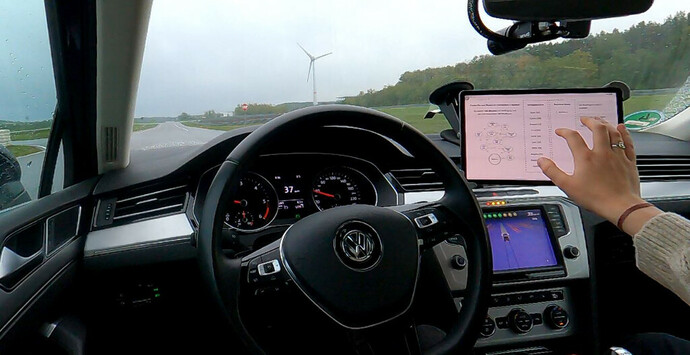Driving test at Dekra-Lausitzring. Photo: Authors’ Union / Dekra
With the introduction of fully automated driving, the driver’s role will change as secondary activities are permitted under certain conditions. However, the driver is supposed to take over driving again within a few seconds if the system requests it. But what if this application is not presented in an awkward situation? A study by Dekra and TU Dresden showed that human performance has its limits when it comes to “multitasking”.
Dr. Thomas Wagner, traffic psychologist and head of Dekra’s Center for Competency Assessment in Driving, warns that in such cases of a warning or an unaddressed order, “the highest requirements must be placed on the technical maturity of automated driving jobs.” It is essential to ensure, as part of the approval process, that the regime will not, under any circumstances, expect a sudden takeover of a human being.
From the experts’ point of view, there is a research gap especially regarding the aspect of “silent alarms” – that is, the lack of demand from the system to take over system failures associated with errors. The expert cautions that “what is probably the most important safety aspect of the highly automated driving mission is under-represented in the current research situation”.
In December 2021, the first vehicle system for highly automated driving (Level 3) in Europe was officially approved by the Federal Motor Transport Authority. Anyone who drives with the Traffic Jam Assist in the future – on highways and similar roads, up to 60 km/h and under other conditions – may “get out of the traffic situation and control the vehicle”, according to Section 1b of the Road Traffic Act. At the same time, it must “remain on alert” to take up the task again at any time if the vehicle’s system asks it to do so or if it realizes that “the essential requirements for the intended use of fully automated or high-powered driving functions are no longer met”.
Traffic psychologists from Dekra, along with scientists from the chair of engineering psychology at the Technical University of Dresden, have examined whether the two can be combined in practice – moving away from vehicle control and at the same time maintaining cognition and rapid intervention in an event errors. “Changing from passive monitoring to active triggering in response to a system request takes a lot of people, even with a few seconds advance warning,” Wagner says. Drivers must develop a rapid understanding of the system and situation, make important decisions within seconds and translate them into appropriate driving action.”
During the study, the circuit on the territory of the Dekra-Lausitzring was crossed several times at a top speed of 50 km / h. During a test drive with a prototype car modified for tests on gridded and highly automated driving, a “false alarm” and three “silent alarms” were triggered. In one case, the car issued a seizure warning without there really being a critical situation. The three silent alarms relate to crossing the stop line with a stop sign, slowly drifting into the oncoming lane and suddenly avoiding a mistakenly recognized obstacle.
Some people had the task of following the automated flight as passive screens and intervene if they deemed it necessary. The second group was also supposed to perform a secondary, visually demanding activity during motorized flight. In general, the acquisition after a “false alarm” turned out to be not a problem: all the test subjects managed to control the car. “It was different with the silent alarm,” Wagner sums up. , here there were obvious difficulties with the acquisition – also in both groups. However, unsuccessful acquisitions were more common in the group with side business across all scenarios. “
Thus, the second function reduces the likelihood that it will be successfully taken over when the “silent alarm” occurs. However, it was shocking to those in charge of the study that even people without side jobs sometimes faced great difficulties.
Homepage

“Certified tv guru. Reader. Professional writer. Avid introvert. Extreme pop culture buff.”







More Stories
Samsung Quantum Dot TV: Art meets technology
Pitch: €56m for energy startup Reverion
Plastoplan: Plastics for Energy Transition